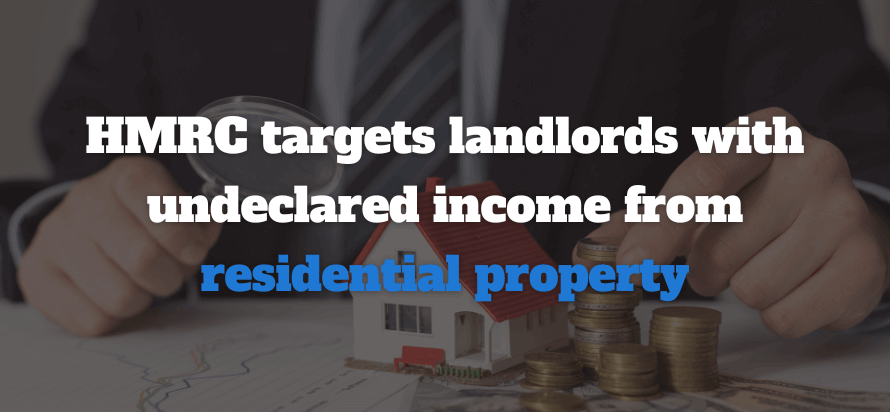HM Revenue and Customs (HMRC) has increased its focus on undeclared income tax from buy-to-let landlords, with an 83% rise in cases during the 2022/23 tax year.
HMRC’s Let Property Campaign has been in existence since 2013 and has remained in place. HMRC continues to send large numbers of ‘Let Property Campaign’ letters to landlords and other buy-to-let investors with undisclosed rental income.

It is likely that this focus will continue as HMRC continue to pull in revenue owed to them via this campaign. HMRC is targeting this sector as they know that huge numbers of buy-to-let and other private landlords (including accidental landlords) are still failing to declare all their rental property income on self-assessment tax returns or are inflating expense claims to reduce their tax bills.
What is the let property campaign?
Let Property Campaign (LPC) is a nationwide campaign launched by HMRC targeting landlords who are earning rental income from residential properties situated, either in the UK or abroad but have failed to declare it. It provides Landlords with an opportunity to disclose their rental income to HMRC and bring their tax affairs in order with the best possible terms.
The Let Property Campaign is an opportunity for landlords who owe tax through letting out residential property, in the UK or abroad, to get up to date with their tax affairs in a simple way and take advantage of the best possible terms offered by HMRC.
What are the terms of the Let Property Campaign?
If you’re a landlord and you have undisclosed income, you must tell HMRC about any unpaid tax. You’ll then have 90 days to work out and pay what you owe.
Under the terms of the scheme, HMRC can reclaim up to 20 years of undeclared rental income and give penalties of up to 100% of the outstanding tax or 200% for offshore irregularities, in some cases. In the worst cases, HMRC could file for criminal prosecution, should it deem necessary.
If you have been found to deliberately have evaded paying income tax on your rental income you are likely to receive the harshest of penalties.
If you have made genuine errors in your accounting and tax returns, then HMRC is likely to be more lenient. HMRC will only reclaim up to six years of undeclared income tax in less serious cases.
The Covid-19 pandemic meant HMRC resources were moved to support other government departments at the time, this resulted in less focus on targeting landlords and a temporary reduction in the number of disclosures made. But HMRC now seems focused once more on contacting landlords about undisclosed rental income.
What to do if you have undisclosed rental income
If you believe you have rental income that’s undeclared to HMRC, then it is better to use the Let Property Scheme to voluntarily declare it now than to wait and be caught by the taxman. You can still make a disclosure and put your tax affairs in order outside of the Let Property Campaign. However, your disclosure will not be part of the Let Property Campaign and the terms offered within the scheme will not be available, meaning you could face larger penalties.
Once a disclosure has been made, you’ll receive a 90-day window to calculate the undeclared income and pay what you owe.
HMRC letter for Undisclosed rental income – What should you do?
There are a variety of letters that HMRC send to taxpayers these include:
- Nudge letters asking the taxpayer to fill in a property ownership history form along with a property declaration form with details of rent received and qualifying expenses to be deducted against rental income.
- Letter from HMRC for income from letting property referencing the Let Property Campaign which offers a offers a better outcome for landlords with undisclosed rental income.
Where does HMRC get its information?
HMRC is targeting landlords who have undeclared income and gains through various campaigns. They have extensive information powers and obtain details from the following sources –
- From the councils that have information about the landlords providing accommodation to the claimants of housing benefits.
- Data from tenancy deposit schemes and government-approved deposit schemes.
- From the legal ownership details mentioned in the land registry.
- HMRC has also acquired powers to obtain information about third parties from the organisations that are engaged in providing services where letting agents or anyone else search for the tenants/organisations providing a similar service.
- Businesses that charge commission for services provided by another party.
- Anyone is handling money on behalf of another person.
- Traditional estate agents and local authorities.
- Internet-based letting services
Therefore, it is advisable landlords use the Let Property Campaign opportunity to disclose their undeclared income or face the risks of higher penalties and interests.
Let Property Campaign penalties
Non-disclosure of taxes on rental income would mean landlords risk higher penalties if HMRC opened an enquiry. Under the Let Property Campaign, Landlords can report undisclosed taxes that are due on the rental income of earlier years to HMRC. If the landlord is registered for self-assessment and has made a careless mistake in reporting the income, the maximum period they need to go back is 6 years to correct the error.
The normal penalties regime will apply when the disclosure is made under the campaign. The penalties will depend on why the landlord has failed to disclose the income, whether there was a reasonable excuse, or deliberately missed. The penalty could also be reduced based on the quality of disclosure and the information provided to HMRC.
Non-disclosure penalties for the LPC can be for failure to notify and for inaccurate returns.
Penalties for failure to notify
If you fail to notify HMRC of the tax you owe within the appropriate deadline, a penalty for failure to notify is levied. If you solely had employment income that was subject to PAYE tax and had not previously filed a self-assessment tax return may be in this situation.
Penalties for inaccurate returns
If youve already filed a tax return but have yet to report your property income, a penalty for inaccurate returns is levied. The penalty rate for filing incomplete or incorrect self-assessment returns is different from that for not filing them at all.
If HMRC opens an enquiry, they can go back up to 20 years and will charge a higher penalty:
- It could be 100% of the tax owed
- It could be as high as 200%, in the case of offshore related income.
Summary
The Let Property Campaign is aimed at landlords who have failed to declare income from renting out property as well as individuals who have incorrectly filled out their tax returns. Like other HMRC campaigns, you will reduce the penalty they have to pay if disclose unpaid taxes or undisclosed rental income voluntarily. If you dont declare all your letting income or any tax you may have underpaid and are caught by HMRC, you could be liable for up to a 100% penalty on the tax owed.
This new and continued focus on the property market and landlords means that HMRC will be looking for anything that is out of the ordinary and can easily match landlord’s details to official records.
If you rent out a second or multiple properties and are not sure if you have declared all your rental profits, have done your own tax returns, have claimed the correct allowable expenses, or think you may have to pay more tax, then get in touch.
or
Have you received an HMRC letter for undisclosed rental income? If yes, contact dns accountants at 03330604732, or you can also e-mail us at enquiry@dnsaccountants.co.uk to discuss your options and how we can help you in reporting letting income to HMRC.
Any questions? Schedule a call with one of our experts.








